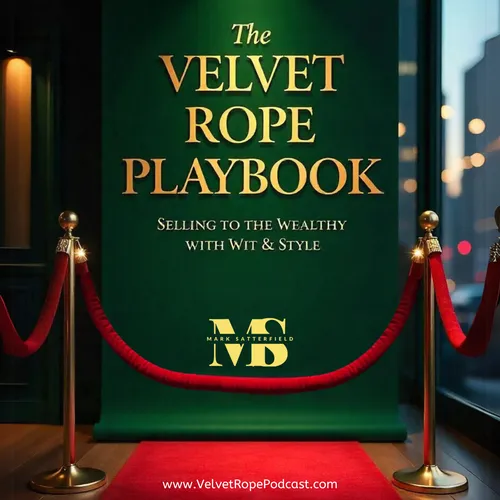How to Speak Bougie: Understatement, Code-Switching, and Elegant Evasions
- Author
- Mark Satterfield
- Published
- Sat 30 Aug 2025
- Episode Link
- https://velvet-rope-playbook.captivate.fm
If you’re trying too hard, you’re already out of the conversation.
The bougie dialect isn’t about what you say—it’s about what you don’t say. Or better yet, what you say just ambiguously enough that only those in the know will catch it. Like a secret handshake made of syllables.
This is the language of people who call their second home “the house upstate,” even if it’s a compound in Jackson Hole. Who refer to their friend with a private plane as “someone I used to work with.” And who, no matter the occasion, always seem to have a “thing in the city” the next day.
Welcome to Bougie-ese.
Rule #1: Name-Drop Without Actually Dropping Names
You don’t say “I had dinner with Bill Gates.” You say, “I was at this thing with a few folks in philanthropy.”
If pressed, you clarify just enough to seem humble. “Oh, it was a small gathering—Bill was there, but we didn’t talk much.” See what you did? You mentioned Gates without sounding like you care. You’re not bragging—you’re burdened by how casual your elite access has become.
This tactic also works geographically:
· “We usually do Maine in the summer.” (Translation: Coastal Kennebunkport estate.)
· “We were skiing in France.” (Translation: Courchevel. Maybe Verbier. Never Aspen.)
· “We’re doing a bit of Europe.” (Translation: You’ll be tagging Lake Como, but only on Stories.)
Rule #2: Always Be Understated
The bougie never say they’re “excited” or “thrilled.” That would be gauche. Instead, everything is “lovely,” “interesting,” or “refreshing.”
You didn’t love the wine—you found it “very drinkable.”
You weren’t blown away by the beach house—you said it had “a nice sense of place.”
Your three-week Mediterranean yacht charter? “Relaxing. Too much sun, really.”
It’s not about hiding enthusiasm. It’s about disguising it as practiced indifference. A calm “we’re spending time in Portugal” will always beat “OMG GUYS, I’M GOING TO PORTUGAL!!!”
Rule #3: Euphemism is Everything
Bougie types never say someone’s rich. They’re “comfortable.”
They don’t say someone’s broke. They’re “figuring things out.”
People aren’t annoying. They’re “a lot.”
A party isn’t boring. It’s “intimate.”
The chef’s new menu isn’t bad. It’s “a departure.”
If you say what you mean directly, you risk being labeled crass. The art is in the artifice. And if all else fails, just sigh and say, “It was… something.”
Rule #4: Learn the Bougie Conversation Topics (and What to Avoid)
Safe:
· Travel (past or upcoming, ideally to places with cobblestones and questionable Wi-Fi)
· Books (but only if they have deckled edges or were recommended in The New Yorker)
· Food (local sourcing, obscure restaurants, vintage olive oils)
· Real estate (passive references to “the renovation,” never Zillow listings)
· Education (private school application trauma is a love language)
Risky:
· Money (you can own wealth, but you never talk about it)
· Work (unless it’s “advisory,” “consulting,” or something you do “on boards”)
· Politics (unless it’s a shared liberal despair over the state of everything)
Never:
· How much you paid for something
· Cryptocurrency
· The words “influencer” or “side hustle” unless it’s deeply ironic
Rule #5: The Signature Phrases
These are actual phrases that signal you are either bougie—or want to be.
· “We like to keep things low-key.” (Usually said before arriving in head-to-toe Totême.)
· “We’re big fans of off-season travel.” (You flew private to St. Barts in July.)
· “I just want things to feel intentional.” (You're agonizing over which plaster finish to use in your powder room.)
· “We’re taking a pause between houses.” (You sold for $7.8M and are casually renting a designer’s guesthouse.)
· “She’s with Dalton now.” (No explanation needed if you know. If you don’t—don’t ask.)
Rule #6: Vagueness = Power
Bougie people do not over-explain. If you’re asked what you do, you say:
· “I work in culture.”
· “It’s a bit of advisory, a bit of real estate.”
· “We’re in the family office space.”
· “I help with brand alignment, mostly.”
The goal is to sound important and unplaceable. Clarity is for consultants. Ambiguity is for the blessed.
Rule #7: Never Correct, Always Improvise
If someone mispronounces “Gstaad” or doesn’t know what Aesop is, you don’t correct them. You smile. You change the subject. You let them learn—ideally from someone else.
Bougie culture prizes elegance over accuracy. It’s not about being right. It’s about being right quietly.
Final Test: Could You Hold a Bougie Conversation?
You’re seated next to someone at a fundraising dinner. They mention their recent trip to “the coast.” Do you:
A. Ask which coast they mean. B. Nod knowingly and say, “We haven’t made it out there this season.” C. Reply, “It’s lovely this time of year—did you get to stay at the farmhouse?”
If you chose B or C, congratulations. You may proceed to the next course (which, by the way, is a wild-caught something over lentils that were foraged, not purchased).
Now you’re fluent. Or at least fluent enough to get invited back.
#BougieHandbook #SpeakBougie #BougieVocabulary #AffluentLife #StatusSignals #HighSocietyTalk #LuxuryLanguage #PoshPhrases #QuietLuxury #EliteEtiquette
